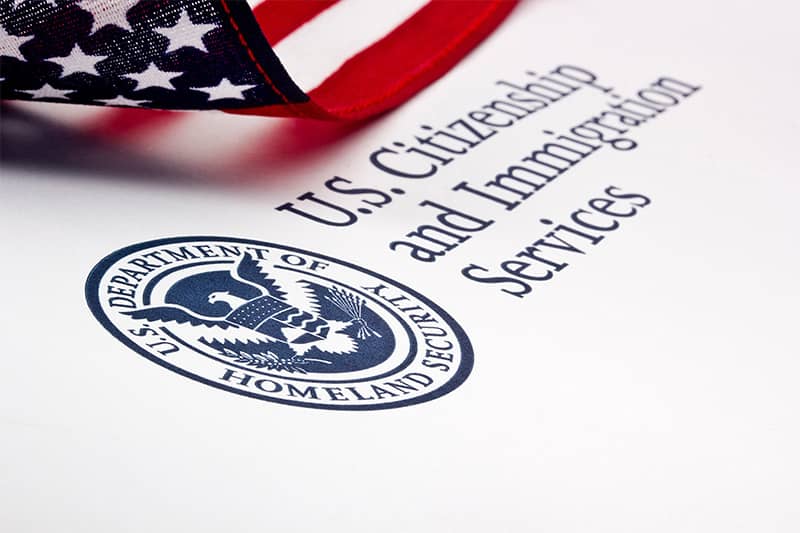Can I Sue USCIS for a Delayed Application?

Waiting on a response from USCIS can be frustrating, especially when delays feel endless, and you’re left wondering if there’s anything you can do to speed things up.
In some cases, filing a lawsuit against USCIS might be an option to get your application moving. This type of legal action, known as a “writ of mandamus,” essentially asks a federal court to compel USCIS to make a decision on your case.
Here, we’ll explore when and how you might consider suing USCIS for a delayed application and what factors to keep in mind before taking that step.
USCIS Processing Times and Delays
USCIS publishes processing time ranges for various types of applications. These ranges, however, are often unrealistically optimistic and fail to reflect the actual wait times many applicants experience. Moreover, USCIS regularly updates these processing times, often extending them without notice or explanation.
A delay that might justify legal action typically occurs when:
- Your application has been pending for significantly longer than the published processing time.
- You’ve made multiple inquiries to USCIS without receiving a substantive response.
- The delay is causing demonstrable harm (e.g., family separation, loss of employment opportunities).
It’s worth noting that what constitutes an “unreasonable delay” can change depending on the specific circumstances and the court reviewing the case.
Legal Basis for Suing USCIS
The primary legal avenue for suing USCIS over delays is through a writ of mandamus. This is a legal action that essentially asks a federal court to order USCIS to make a decision on your case.
The legal basis for such actions often includes:
- The Administrative Procedure Act (APA), which requires agencies to conclude matters presented to them within a reasonable time.
- The Mandamus Act, which allows federal courts to compel an officer or employee of the United States to perform a duty owed to the plaintiff.
These lawsuits are typically filed in federal district court and name as defendants the relevant USCIS officials, the Department of Homeland Security Secretary, and sometimes the U.S. Attorney General.
When to Consider Legal Action Against USCIS
Deciding to sue USCIS is not a step to be taken lightly. Consider legal action when:
- Your case has been pending well beyond the posted processing times.
- You’ve exhausted all other options, including making inquiries through the USCIS contact center, reaching out to your congressional representative, and submitting case assistance requests.
- The delay is causing significant hardship (e.g., inability to work, prolonged family separation).
- You have a clean immigration record, and there are no apparent issues with your application that could justify the delay.
How to Sue USCIS
If you decide to proceed with a lawsuit, here’s a general overview of the process:
- Preparation: Your attorney will gather all relevant documentation about your case and prepare the legal complaint.
- Filing: The lawsuit is filed in the appropriate federal district court.
- Service: The defendants (USCIS officials) must be served with the lawsuit.
- Government Response: The government typically has 60 days to respond to the lawsuit.
- Negotiation or Litigation: Often, the act of filing a lawsuit prompts USCIS to take action on the delayed application. If not, the case proceeds through the court system.
- Resolution: The case may be resolved through a court order, a settlement, or USCIS finally adjudicating the application.
Potential Outcomes
Suing USCIS can lead to several potential outcomes:
- Prompt Adjudication: In many cases, simply filing the lawsuit prompts USCIS to process the application quickly.
- Court-Ordered Action: The court may order USCIS to adjudicate the application within a specific timeframe.
- Dismissal: If the court finds the delay not unreasonable or if USCIS can justify the delay, the case may be dismissed.
- Settlement: The government may agree to process the application within a certain timeframe to avoid further litigation.
It’s crucial to understand that a lawsuit can compel USCIS to make a decision, but it cannot guarantee a favorable decision on your application.
Risks and Considerations
While suing USCIS can be an effective tool in some cases, it’s not without risks:
- Cost: Legal action can be expensive, involving filing fees and attorney costs.
- Time: While a lawsuit may expedite your case, the litigation process itself can take several months.
- Scrutiny: Filing a lawsuit may lead to increased scrutiny of your application.
- Potential for Denial: If USCIS is forced to make a quick decision, there’s a risk they may err on the side of denial if there are any unresolved issues with the application.
- Future Implications: Consider how litigation might affect future interactions with USCIS or other government agencies.
Exploring Alternatives to Suing USCIS and Why Legal Guidance Matters
Before resorting to a lawsuit, consider these alternatives:
- Case Inquiry: Use the USCIS online tools or call the USCIS Contact Center to inquire about your case status.
- Expedite Request: If you meet certain criteria, you may be able to request that USCIS expedite your application.
- Congressional Assistance: Reach out to your congressional representative’s office for assistance in inquiring about your case.
- Ombudsman: The Office of the Citizenship and Immigration Services Ombudsman can sometimes assist with delayed cases.
If these steps don’t yield results and you’re considering a lawsuit, having experienced legal representation becomes critical. Federal litigation against a government agency is complicated, and an immigration attorney can help by:
- Determining if a lawsuit is right for your situation
- Navigating the procedural steps of federal court
- Building a strong case with targeted legal arguments
- Negotiating with government attorneys to seek resolution
- Representing you effectively in court if necessary
Hold Uscis Accountable With Help From the Law Office of Lina Baroudi
The option to sue USCIS for a delayed application represents a powerful tool for holding the agency accountable and potentially resolving protracted delays. However, it’s a serious step that requires careful consideration of the potential benefits, risks, and alternatives.
The very existence of such lawsuits highlights the systemic issues within our immigration system—a system often characterized by opaque processes, inconsistent timelines, and a lack of accountability. While legal action can provide a remedy in individual cases, it underscores the need for comprehensive reform to create a more efficient, transparent, and fair immigration process.
If you’re dealing with a prolonged delay from USCIS, the Law Office of Lina Baroudi can help you assess your options. Whether exploring alternative approaches or pursuing legal action, we’ll provide the experienced guidance you need to navigate this process. Contact us today for a consultation, and let us help you determine the best path forward for your case.



